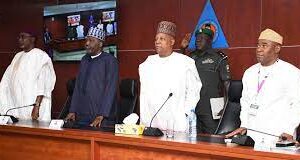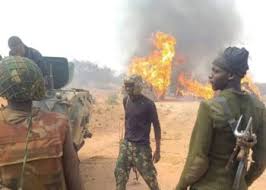The Special Adviser to President Bola Ahmed Tinubu on Energy, Mrs. Olu Arowolo Verheijen, has said the current administration is not paying any subsidy on petroleum.
Mrs. Arowolo Verheijen’s clarification Friday was against the backdrop of speculations that the federal government was still paying for fuel subsidy on petroleum products.
She, however, said the federal government is intervening in the sector to maintain price stability in order to avoid social unrest due to the hardship occasioned by the removal of fuel subsidy.
She stated this while answering questions from journalists during the 4th edition of ministerial briefing organised by the Federal Ministry of Information and National Orientation in Abuja.
According to her, “The subsidy was removed on May 29, 2023. However, the government has a prerogative (system) – whether in the United States of America, the West or Eastern countries – to maintain price stability and prevent social unrest.
“So if prices are moving up, they reserve the right to intervene, it is done in the United States. During COVID-19, there were a lot interventionist moves and there were also subsidies. All governments reserve that right.
“If for whatever reason, the administration has reviewed that it was not the right time to see prices fluctuate given the level of hardship in the country, given the inflation, the government has the right to intervene intermittently. All governments do so, but it does not negate the fact that the subsidy has been removed.”
She attributed the high cost of cooking gas to foreign exchange and market forces, noting that the federal government was working hard to put measures in place to bring down the price.
“On the price of cooking gas, the president introduced some initiatives around last Christmas, and we saw a deep in prices. Significant amount of our (liquefied petroleum gas (LPGs) is imported; we are price takers, not price setters.
“However, because the president was concerned about cost of living, he approved a fast tracking of fiscal incentives to enable more investments into the LPG space with the hope that if we achieve scale we can bring down cost, and we saw a deep in prices but unfortunately, foreign exchange and the market forces moved against us and those prices increased.
“We are going to continue to work and look at more opportunities to improve supply and scale up and enable more LPG into the market at affordable prices. This is a top priority of this administration,” she said.
On CNG-powered vehicles
Answering questions on availability of infrastructure to enable transition to Compressed Natural Gas (CNG) powered vehicles, she said the federal government has put measures in place to attract investments into the sector in order to ensure availability of gas.
“Over 70 percent of our gas reserves remain undeveloped. We need to address fundamental issues in the sector so that we can attract capital to the infrastructure end.
“There no one who is going to invest in mainstream infrastructure if they don’t have assurance of the attractiveness of gas supply.
“So if the gas people are not making investments because the fiscal terms or the business environment is a very difficult one to invest in, then it would be very difficult to mature mainstream and downstream projects because you have to deal with the abinitio problem which is gas supply.
“And this is exactly what president Tinubu has done by fast tracking policy directives in the sector. To ensure that we have sufficient gas supply whether we are trying to export through Trans Sahara Gas Pipeline , whether we are trying to Compressed Liguified Natural Gas for domestic use , whether we are trying to have floating LNG as alternative way of getting gas into the market, all of those things are enabled by these policies that unlocks supply . You cannot have infrastructure to compressed gas if there is no gas. You can’t build roads if there no cars to drive on them,” she said.
Earlier while addressing the press, Mrs Olu said President Tinubu introduced three Policy directives as part of ongoing efforts to create a more enabling business environment in the sector.
She said, “Since 2016, Nigeria has only accounted for only four percent (4%) of Africa’s total oil and gas investments, despite possessing thirty-eight percent (38%) of the continent’s hydrocarbon reserves.”
She said President Tinubu is determined to reverse this trend and take decisive steps to ensure to a conducive business climate and reposition Nigeria as a preferred investment destination for oil and gas sector.
She disclosed that to achieve these objectives, “the President issued a Presidential Directive to streamline and clarify the scope of the two Regulators in the petroleum sector to provide certainty and create conducive business environment.”
She said he, Directed the National Security Advisor (NSA) and her to coordinate enhanced security measures in the Niger Delta.
“Owing to this Directive, the TNP pipeline which had been repeatedly vandalized is now enjoying improved uptime; availability has practically doubled since these directives were implemented.
“This has translated to increased liquids of over 200,000 barrels/day being transported over the last 6 months. It has increased the availability of NLNG Trains 1-6 from 57% in 2023 to 70% in Q1 2024,” she said.




